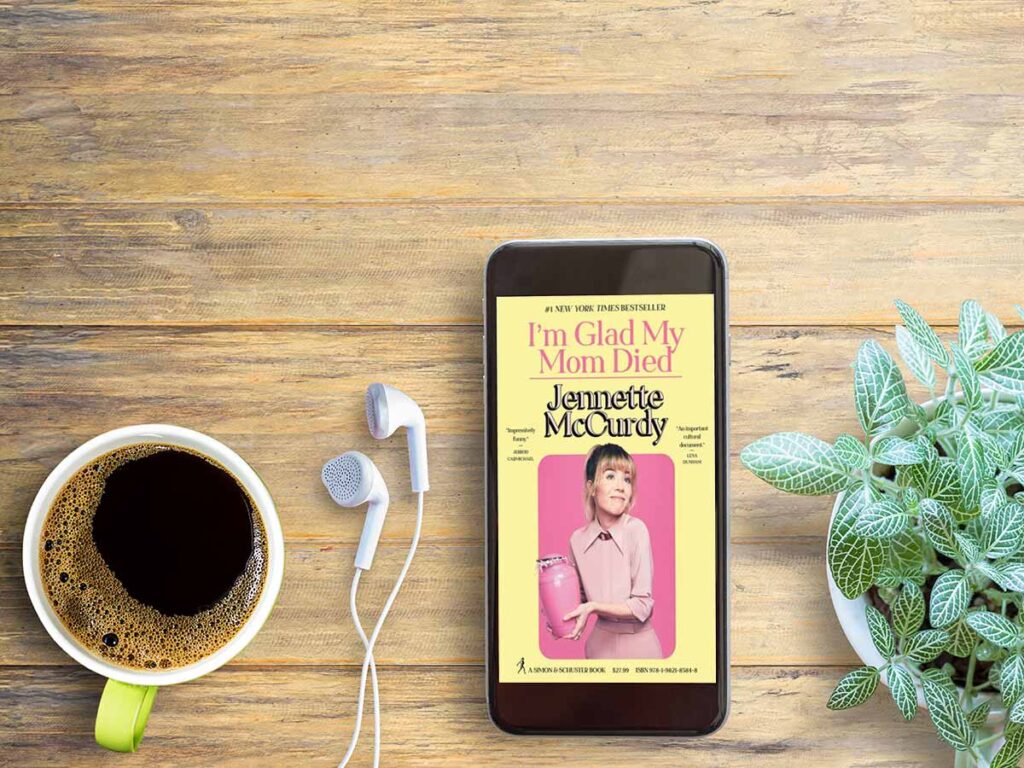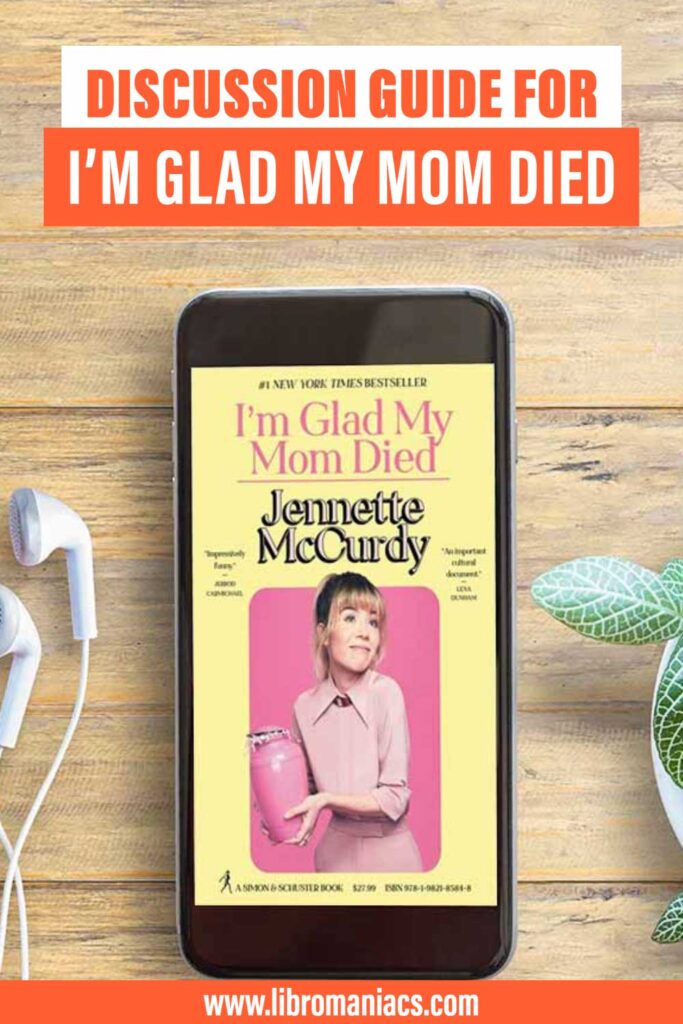Jennette McCurdy’s memoir offers up a very tough take on her upbringing and her stardom on the iCarly Nickelodeon show. Forced to follow her mother’s dreams, McCurdy ends up in a profession that she doesn’t love, held hostage by her mother’s impossible expectations and abusive demands. The book is shocking, raw and painfully funny at times.
Holy smokes, there’s a lot to talk about with this book and our I’m Glad My Mom Died book club questions will help you get started. Use this discussion guide to dive into the book’s coverage of physical abuse, severe eating disorders, emotional blackmail, abuse of power, and Jennette’s hard work at bringing herself back from the brink.
Check out the book’s synopsis (does it accurately reflect your experience of the book?), then use the book club questions to discuss the book. We’ve got some selected review blurbs that are worth discussing as well. And we’ve also got suggestions for three related reads if you would like to keep going in the family memoir genre.

(This article contains affiliate links. This means that if you choose to purchase, I’ll make a small commission.)
I’m Glad My Mom Died Synopsis
I’m Glad My Mom Died, Jennette McCurdy
Jennette McCurdy was six years old when she had her first acting audition. Her mother’s dream was for her only daughter to become a star, and Jennette would do anything to make her mother happy. So she went along with what Mom called “calorie restriction,” eating little and weighing herself five times a day. She endured extensive at-home makeovers while Mom chided, “Your eyelashes are invisible, okay? You think Dakota Fanning doesn’t tint hers?” She was even showered by Mom until age sixteen while sharing her diaries, email, and all her income.
In I’m Glad My Mom Died, Jennette recounts all this in unflinching detail—just as she chronicles what happens when the dream finally comes true. Cast in a new Nickelodeon series called iCarly, she is thrust into fame. Though Mom is ecstatic, emailing fan club moderators and getting on a first-name basis with the paparazzi (“Hi Gale!”), Jennette is riddled with anxiety, shame, and self-loathing, which manifest into eating disorders, addiction, and a series of unhealthy relationships. These issues only get worse when, soon after taking the lead in the iCarly spinoff Sam & Cat alongside Ariana Grande, her mother dies of cancer. Finally, after discovering therapy and quitting acting, Jennette embarks on recovery and decides for the first time in her life what she really wants.
Told with refreshing candor and dark humor, I’m Glad My Mom Died is an inspiring story of resilience, independence, and the joy of shampooing your own hair.
10 I’m Glad My Mom Died Book Club Questions
These questions have been tailored to this book’s specific reading experience, but if you want more ideas, we also have an article with 101 generic book club questions.
- The story is told through a series of linear vignettes, with some time gaps in between. How did that format work for you? We you able to fill in the gaps?
- Of all of the red flags in Jennette’s relationship with her mom, which was the reddest for you?
- Look, we aren’t psychologists, but it’s obvious that mental illness pervades Jennette’s life– there are her own issues, and also that of her mother, boyfriend and perhaps even her father. How did you respond to reading about it? How might you have responded had you been a family member, fellow stage mom or friend?
- “I’m becoming an angry person with no tolerance for anyone. I’m aware of this shift and yet have no desire to change it. If anything, I want it. It’s armor. It’s easier to be angry than to feel to pain underneath it.”
Was her anger an avoidance mechanism? Or did it ultimately save her? - “She wanted this. And I wanted her to have it. I wanted her to be happy. But now that I have it, I realize that she’s happy and I’m not. Her happiness came at the cost of mine. I feel robbed and exploited.”
Have you found yourself in circumstances where your desire to please others came at too high a cost for your own happiness or sanity? - She says in the book that she had to get a handle on the disordered eating before she could deal with the rest. How did you respond to McCurdy’s therapy journey? And what did you think of her first therapist? The hugging and the insistence on being Jenette’s plus one at industry events. Was that a helpful approach, or did it smack a little too much of her mother’s wannabe syndrome?
- In interviews, McCurdy frequently deflects questions about the hush money offer from Nickelodeon. She felt that it it’s a headline grabber, but that focusing on it too much distracts from her primary narrative? If so, then why do you think she included it? And would you have taken the money?
- Did you listen to the book on audio? If so, How did you respond to McCurdy’s delivery?
- “Why do we romanticize the dead? Why can’t we be honest about them? Especially moms, they’re the most romanticized of anyone.”
Good question. Do we romanticize the dead? Is it OK to be glad (or at least relieved) when someone has died? - When you hear stories like this (and other high profile child star meltdowns from Lindsay Lohan and Brittany Spears), does it make you view young actors differently? How can you be a discerning consumer of entertainment that features minors? And what should the studios and agents be doing differently?
Selected Reviews for I’m Glad My Mom Died
“I’m glad her mom died too.”
“One thing I’ve seen a lot of people say about this book is “wow she’s so funny, her humor is great, etc.”, which I don’t entirely understand since everything Jennette went through and described in this book was devastating. From the multiple forms of abuse, eating disorders, and having to grow up too fast….um where is the humor in that?!”
“The exploitation of children in the entertainment industry is something that really needs to be discussed. Seeing a child star expose the abuse she suffered in the industry is truly heartbreaking, but extremely important, especially in this day and age, where even more parents are pressuring their children and forcing them to put themselves out there for fame. I wonder if in 10 years we’ll see similar testimonies from kids of family channels who grew up making money for their parents in an even more disgusting way: by having they entire lives documented and posted online for all to see.”
“The inexplicable decision of using a present tense killed every chance of expressing self-awareness, self-reflection and healing, and the book felt like a journaling therapy exercise. It didn’t help the fact that writing the memoir focusing on traumas and single events, each one of them taking up one short chapter, made the “narration” very disjointed.”
3 Books Like I’m Glad My Mom Died
We have a whole list of audiobook memoirs which, like McCurdy’s book, are read by the author. Some of our faves on that list are Shrill, Between the World and Me (World and Me guide here) and Born a Crime (Born a Crime guide here), and Crying in H Mart (H Mart guide here). But there are 20 total on the list, so lots of fodder there.

Crying in H Mart, by Michelle Zauner
This is a good pick if you are keen to explore more of the mother/daughter dynamic, but with a healthier relationship to food.
Crying in H Mart is far more than a simple food memoir. In the book, Zauner explores her life growing up as a Korean American, an awkward adolescence, her Mom’s high expectations and lots and lots of eating in her Grandmother’s apartment. It’s also a painful foray in to the pain of grief. It’s a searing, devastating and often funny look at Zauner’s life (so far).
Zauner is a singer and guitarist, so she certainly knows how to deliver a performance. But what makes this memoir so good on audiobook is that you can really hear her emotions coming through.

The Glass Castle, Jeanette Walls
Walls grew up in a nonconformist family and lived with her parents and three siblings as nomads. There was love in the home, but there was also a lot of chaos and a severe lack of basic care. She and her siblings to fend for themselves. But Walls also describes her parents’ passion, imagination, and kindness.
This is a story of family, with all of its flaws, and how Jeanette found her own sense of self and success.

The Less People Know About Us the Better, Axton Betz-Hamilton
Back before the internet was a thing, Axton’s family was a victim of identity theft. They were left in financial ruin and her parents reacted to the crime by becoming paranoid and self-isolating.
As a result, Axton experienced a lot of trauma as a kid. When she gets older, she explores academia and goes into the field of identity theft research. After a series of heart wrenching family events, she ultimately discovers the identity thief and it’s a very painful, personal revelation.
Have a listen on Audible. Try audio books for free for 30 days.
Share these I’m Glad My Mom is Dead book club questions with your friends:

